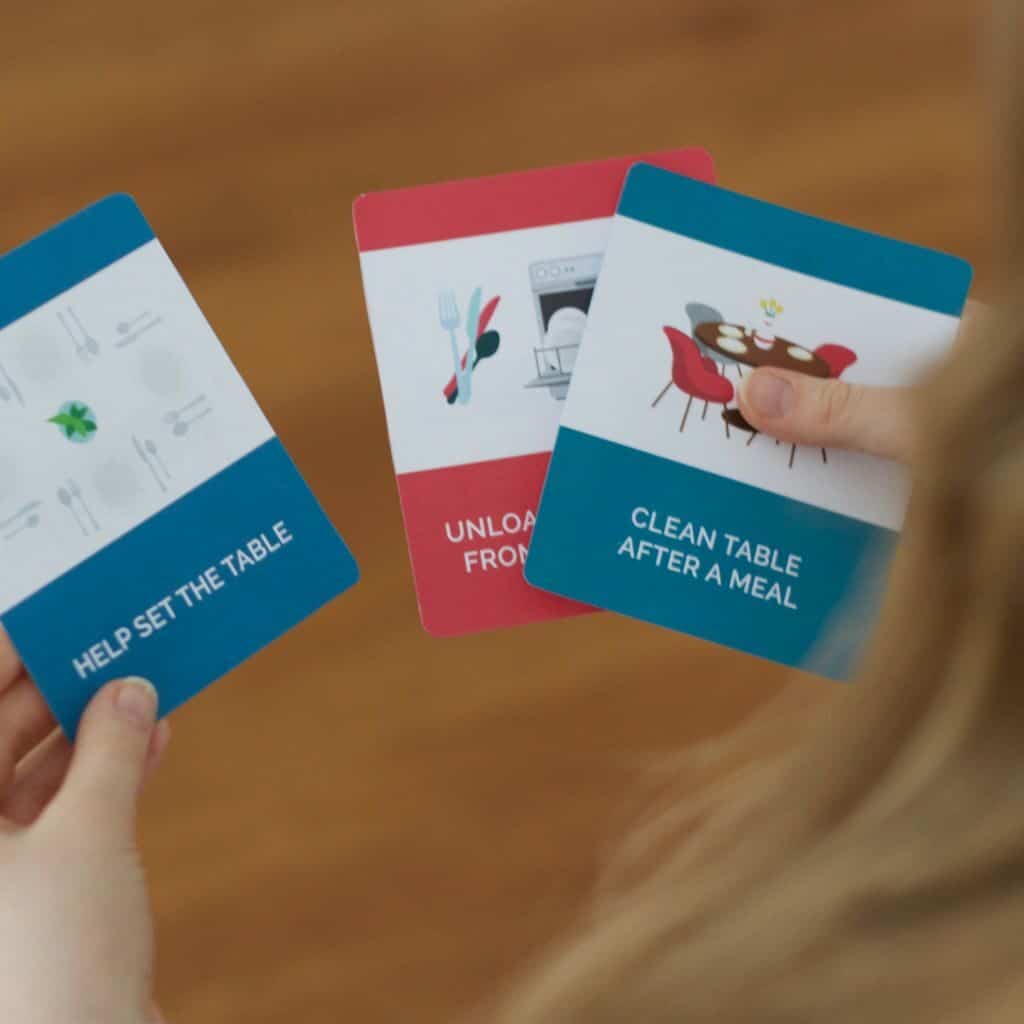How to Motivate Kids to Do Chores (Without Paying Them!)
Paying kids for chores doesn’t always work, and some research suggests it could do more harm than good. So what does work?
A typical morning in our house goes like this: wake-up, drag ourselves downstairs, devour a bowl of oatmeal or cereal, or sometimes – just to mix it up – crunch on a piece of toast.
So far, nothing special. But what happens next is one of the best parenting experiences ever: my kids do their morning chores.
After a few minutes of enjoying breakfast and waking up a tad, my girls set off to do their tasks: make lunch, take care of our cat, sweep the floor, and get their bedrooms in order.
About a year ago, I decided my girls were old enough to take on more responsibility and help around the house — to pull their own weight so-to-speak. It took a little work to get started, but the payoff has been worth it.
I admit, sometimes moaning is involved. And yes, there are days when filling the cat’s water is forgotten. But in general, for the past year, chores have been relatively successful in our house.
Until recently.
We hit a bump in the road when my daughter discovered a friend gets paid to do chores.
“Why don’t I get paid to do chores?” she asked.
Dang it.
Just when the whole chore thing appeared to be going well, we had to deal with this twist.
Why parents pay their kids to do chores
This was bound to happen, that one of my kids would discover a friend gets paid to do chores.
According to the Fiscal Times, 90% of kids need to do some chores in order to receive their weekly allowance.
Some of these parents pay their kids to do chores simply because their own parents paid them. Others do it because they feel their children should learn to work for money. While still others assume paying kids is the only way to motivate them to do their chores.
But here’s the catch
Trying to instill a work ethic in our kids is undoubtedly an admirable goal. Who can argue with teaching kids to work for things they want? Work comes first, rewards follow.
But if we’re not careful, we’ll train our kids to only be motivated by tangible rewards, and then they won’t develop the intrinsic motivation they’ll need later in life for success and fulfillment.
Research backs this up: while providing kids with a reward (in this case money) for accomplishing a task does work initially, there can be negative consequences in the long run.
Interested in getting your kids started on chores? My four-lesson course will teach you how to get started, avoid nagging & power struggles, and keep your kids motivated. Click here or the image below to learn more.

Why paying kids to do chores can backfire
Loftier goals aside, sometimes when we parents pay kids for chores, it’s simply because we want kids to do them. After all, those chores help the family and take some burden off of us as parents.
For some parents, these immediate needs might even outweigh concerns about intrinsic motivation and the long-term effects of paying for chores. But one thing parents of this mindset don’t always consider is that paying for chores can backfire.
For example: if children are paid to do chores, what happens if they decide the money just isn’t worth the effort of doing chores anymore?
Then we’re stuck.

Because then we’re faced with two options:
- Let our kids stop doing chores
- Pay them more money
If we choose the second option, who’s to say one increase in pay will be enough? What if they keep asking for more?
Taking this one step further, if we pay our kids for chores, kids might expect to be paid to do ANYTHING around the house.
Consider the story (as told in the Atlantic) of one mother who used rewards for motivation. After she asked her eight-year-old son to help his younger brother clean up a spill, the boy responded: “what will you give me?”
In the same article, another couple said: “we told our daughter that she could earn extra points toward her goal of getting a new phone if she would help us clean the kitchen after dinner, but she just said, ‘no, thanks.’ Now what?”
In the end, relying on payment to motivate kids to do chores may wind up having the exact opposite effect — removing all motivation unless money is involved.
But don’t kids need to learn the connection between work and pay?
Just because paying kids for everyday chores has its drawbacks, doesn’t mean parents can’t still provide kids with other opportunities to earn money. This is certainly a worthwhile goal — it helps kids develop “grit” and take on an entrepreneurial mindset.
If kids are eager to earn money but aren’t old enough to get a job, there’s no reason why certain tasks above-and-beyond daily chores can’t be compensated.
Each family needs to decide on its own which tasks are considered mandatory chores and which are paid work. A general rule of thumb we use in our family is to ask ourselves: could we technically pay an outside company to do this task? If so, we might pay our kids to do it.
For example, washing windows isn’t something families do every day. And it’s possible to hire a cleaning company to do this task. So, why not pay our kids to do it? They’re less expensive, for sure. And kids can learn from the experience of taking on a job for a specific fee and doing it well.
Some families take it a step further by encouraging kids to be on the lookout for work — either in the house our elsewhere — that they could be compensated for. Parents can also encourage kids to negotiate the amount they are paid for a given task, which helps them practice another valuable life skill.
See this related article for more ideas: How Young Kids Can Earn Money and Learn the Value of Work
Get your kids started on chores with these cards. They can serve as a visual reminder for kids and make doing chores fun! Click here to learn more.
Three tips to motivate kids to do chores without pay:
So if you shouldn’t dangle dollar bills in your kids’ faces to get them to do chores, you might wonder how you’re supposed to motivate them to help out around the house.

Here are three tips for motivating kids to do chores without paying them:
- Start young. Young kids are especially eager to help – and to copy their parents, or to try new things. And if your kids can’t remember a time when they didn’t do chores, the chores will just become a part of regular family life.
- Make chores something you do as a family. It’s probably a stretch to call chores a “fun, family activity” but there can be something engaging for kids about the whole family working together. You could even go as far as listing all the chores everyone in the house does, including parents, to make it clear that the whole family is unified in the effort.
- Try this rule: “first things first.” This rule means kids can’t have screen time, ride their bikes, hang out with friends, or do other fun things until chores are done. Chores come first. It’s that simple. And furthermore, it’s a life lesson that will benefit kids as they get older. Because, doesn’t the “first things first” concept also apply to just about every aspect of adult life?
How I got out of that sticky situation
I stood there in our kitchen trying to reconcile that my daughter now knew the truth – some kids get paid for chores.
“So, why don’t we?” she asked again, clearly needing a good answer.
I fell back on the explanation I use a lot in situations like these: “all families are different,” I explained. “Some families pay their kids for chores and some feel that chores are just something all family members do to help the household.”
“So, can we be the kind of family that gets paid for chores?” she persisted.
I then pointed out that my husband and I don’t get paid to clean the kitchen or do the laundry.
She grudgingly accepted this answer (thank goodness) and went on sweeping the floor.
And the next morning we woke up, dragged ourselves downstairs, ate more cereal and toast, and did the whole chores routine all over again – without anybody asking to get paid.
You may also like:
The Difference Between Praise and Encouragement in Parenting and Why it Matters
7 Tips to Help You Begin Toddler Chores Successfully
Age-Appropriate Chores for Kids – Lists by Developmental Stage
Why Paying Kids to Get Good Grades Can Backfire
What to do next…
1. Subscribe to Self-Sufficient Kids’ email list.
Like what you read here and want to learn more? Every Thursday I’ll send you one parenting tip about raising self-sufficient kids and creating the peaceful relationship you yearn to have with your child. Click here to sign up.
2. Take one of my quizzes!
Find out if you’re raising a self-sufficient kid (click here) or if you’re doing too much for your kids (click here). At the end of each quiz, you’ll be asked to provide your email address to see the results.
3. Get your kids started on chores.
Learn how to get your child started on chores (& keep them motivated + avoid power struggles) by enrolling in my Get Your Kids Successfully Started on Chores course. Click here to learn more and sign up.

About Kerry Flatley
Hi! I’m Kerry, the mother of two girls and a certified parent educator. I believe it is possible for parents to have a supportive, loving, and warm relationship with their kids while raising them to be independent and ultimately self-sufficient. Over the years, I’ve read numerous books and articles that support this belief and I’ve put these ideas into practice with my own kids. Read more about me and Self-Sufficient Kids here.



